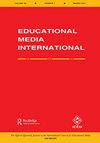A review of research on machine learning in educational technology
IF 1.4
Q2 EDUCATION & EDUCATIONAL RESEARCH
引用次数: 24
Abstract
ABSTRACT The purpose of this review is to investigate the trends in the body of research on machine learning in educational technologies, published between 2007 and 2017. The criteria for article selection were as follows: (1) study on machine learning in educational/learning technologies, (2) published between 2007–2017, (3) published in a peer-reviewed outlet, and (4) an empirical study, literature review, or meta-analysis. Eighty-nine articles were chosen, after the first round of the article selection process. Through a second look at the articles, fifteen articles that did not match the criteria were eliminated. After the close examination of the seventy-four articles, certain demographical and thematic trends emerged. The top contributors to the body of research were Taiwan and the United States while the most productive year was 2017. The most utilized machine learning methods were vectors and decision trees. Commonly researched areas, on the other hand, were automation, cognitive process assessment, prediction, intelligent tutoring systems, and opportunities and challenges in the use of big data & learning analytics. Recommendations for future research focus on expanding geographical diversity, incorporating Bayesian and fuzzy logic methods more in educational machine learning work.教育技术中机器学习的研究综述
本综述的目的是调查2007年至2017年间发表的教育技术中机器学习研究的趋势。文章选择的标准如下:(1)关于教育/学习技术中的机器学习的研究,(2)发表于2007-2017年之间,(3)发表于同行评议的渠道,(4)实证研究、文献综述或元分析。经过第一轮文章评选,共有89篇文章入选。通过对文章的第二次检查,15篇不符合标准的文章被淘汰了。在仔细审查了74条之后,出现了某些人口和专题趋势。研究领域贡献最大的是台湾和美国,而产出最高的年份是2017年。最常用的机器学习方法是向量和决策树。另一方面,常见的研究领域是自动化、认知过程评估、预测、智能辅导系统,以及使用大数据和学习分析的机遇和挑战。对未来研究的建议侧重于扩大地理多样性,在教育机器学习工作中更多地结合贝叶斯和模糊逻辑方法。
本文章由计算机程序翻译,如有差异,请以英文原文为准。
求助全文
约1分钟内获得全文
求助全文
来源期刊

Educational Media International
EDUCATION & EDUCATIONAL RESEARCH-
CiteScore
3.20
自引率
0.00%
发文量
10
 求助内容:
求助内容: 应助结果提醒方式:
应助结果提醒方式:


